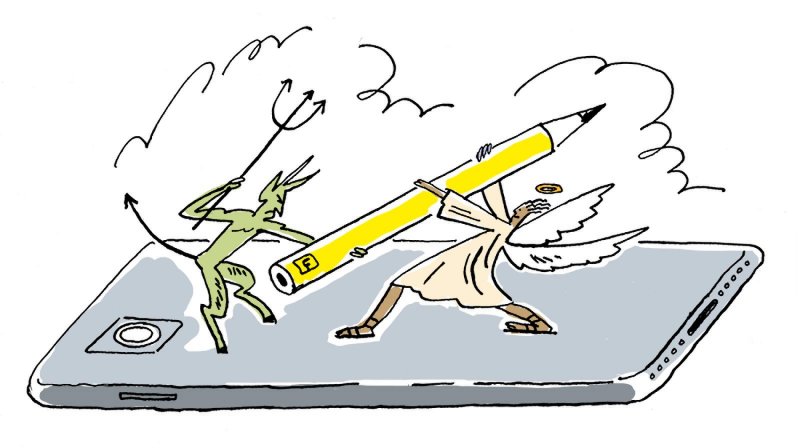When a joke becomes a social media storm – how much can you tell about what goes on at work?
Employees have the right to express their views, even if these do not align with what their employer would like. However, you should take care when it comes to what you can and should be saying about your employer.
Like other citizens, employees are entitled to freedom of speech under the Finnish constitution. Freedom of speech is a basic right that is limited by, for example, the Employment Contracts Act and criminal law provisions on the protection of private life and libel.
“Basically the situation is that employees are allowed to express their opinions. But clearly once you enter into an employment relationship you won’t be able to speak your mind as freely as before”, says Päivi Korpisaari, professor in communications law at the University of Helsinki.
When assessing what an employee can tell about their work publicly, the obligation of loyalty in the Employment Contracts Act is a key concept. In practice this means that employees are obliged to take the employer’s interests into account in what they do.
The obligation of loyalty means an employee’s conduct should be what can be reasonably expected of an employee in their position.
“What can reasonably be expected of someone is a very vague expression. It will also vary depending on a person’s job and position. The higher the position, the more loyal a person’s conduct towards their employer is expected to be.”
The obligation of loyalty applies to all persons round the clock and every day of the week, and it applies equally to leisure time and all social media channels.
“If, say, an employer implements changes at the workplace, employees can’t criticise those changes in their leisure time.”
Korpisaari stresses that when talking about freedom of speech it is important to distinguish between freedom of opinion and speech. An individual can hold whatever opinions they like. But when you express your own opinions in some form, be it in speech or in writing, that’s a case of freedom of speech.
Social media storm can come as a surprise
Social media services have brought communications and publishing channels within everybody’s reach. Anybody can express their ideas easily, quickly and widely on Facebook or Twitter, for example. That’s why social media posts cause more problems than for example traditional media publications, where it is not so easy for anybody to state their views.
Information that is shared during coffee breaks doesn’t usually reach a wider audience, but social media content is always public or at least semi-public, depending on the service used and the number of followers or friends a person has.
“Some of the trickiest situations are when an employee makes thoughtless comments, for example on groups of people who might be members of staff, stakeholders or customers of their employer”, Korpisaari says.
"It was a good gesture that the employer
was defending the worker."
Even if an employee says on their social media account “I am writing as a private person and the opinions expressed are solely my own”, the views expressed there can lead to a social media storm and in that way damage the employer’s reputation.
”It’s worth remembering that at any time someone can take a screen shot of a post intended for a small number of people and pass it on. There are also lots of loudmouths online who deliberately want to blow things up”, Korpisaari says.
In August there was an outcry on Twitter about a tweet that was meant as a joke about a male customer posted by a young female sales assistant at a JYSK furniture store. The post spread in an instant, and commentators quickly discovered the name and location of the tweeter’s employer. Some demanded that the employer take action, and many others said they would boycott the company if the tweet led to any consequences for the employee.
“In the JYSK case, the employer commented on their own account that they would deal with the matter internally and would not tolerate any harassment or online bullying. It was a good move by the employer to defend the employee”, Korpisaari says.
Then again, an ill-considered tweet by a Hesburger employee in 2016 led to them being sacked. In it, he disapproved of a customer’s political sympathies following the US presidential election. The post didn’t state his personal details or his employer, but soon afterwards a campaign started in a chat forum and on social media that revealed the true name of the person behind the post, and where he worked. These details were retweeted and sent to Hesburger in a coordinated manner.
A social media storm can blow up quickly, but can also subside quickly.
“Employers shouldn’t act hastily under pressure – a calm, considered response is better. Both parties should think through how to respond to a social media storm in public”, Korpisaari sums up.

Social media behaviour is all-important
“One typical feature of social media storms is that they can be unpredictable. Storms can be whipped up from very little and all of a sudden”, Korpisaari points out.
The best way to steer clear of a social media storm is to think twice before making a post. With work-related issues in particular, Korpisaari says it’s essential to think what the post looks like from the viewpoint of customers or your employer. It can also be advisable not to mention your workplace, job or employer if these are not necessary.
“People can also have several roles at the same time: an employee can also be well known for their social media blog or be an active political influencer. If you have many roles, there are many counterparts to take into account in your social media behaviour.”
It is also very important that what you talk about is true. Especially if an employee says negative things about their working conditions, their employer or customers, they are well advised to make sure that what they say is truthful. The tone of a message can be crucial, as it should not be offensive towards your employer.
Problems can be talked about
Employers cannot interfere in the exercise of freedom of speech on social media all that easily. Korpisaari thinks this is more of an exception.
Examples of exceptions like this could be if an employee spreads false information on social media or puts out derogatory comments about minorities, whether these are about sexual orientation, religion or ethnic groups.
In these cases, invoking freedom of speech will not protect the author from possible consequences. In assessing these, freedom of speech is weighed up against other basic and human rights recognised in Finnish legislation and various international treaties.
“For example, articles that are discriminatory or incite to violence could qualify as a criminal offence in law”, comments PAM’s lawyer Julia Jeganova.
“It should also be borne in mind that there is no direct link between criminal liability and the conduct required in an employment relationship. In other words, activity that is not prohibited in criminal law could still lead to termination of employment”, she continues.
PAM has also settled disagreements where the employee’s freedom of speech had to be weighed up against the obligation of loyalty. In one case the employer had terminated the employee’s contract based among other things on the employee’s Facebook posts.
“In these cases you must always remember that the employee must always receive a warning and have the chance to put things right”, Jeganova comments.
You can talk about problems at the workplace, but they should first be raised internally at work. If, despite repeated attempts, the problem has not changed, only then should you consider discussing the matter publicly.
Also, the whistleblower directive adopted in October 2019 will from the start of next year provide better protection for those who reveal irregularities and make it easier for employees to raise workplace problems through secure reporting channels.
Overall assessment is essential
According to Korpisaari, the relationship between an employee’s freedom of speech and the duty to respect the employer is complex, and it is hard to come up with generally applicable rules. Every employment relationship is different and each case has to be interpreted as a whole.
The employer has the right to require employees not to divulge matters that are operationally critical and are trade secrets. This could include preventing details of innovations or development projects being revealed to competitors. On the other hand, Korpisaari thinks there can be no general ban on commenting on an employer or someone’s own job.
Employees can comment on their work in general terms. Equally, in co-operation negotiations, which have a large social impact, employees are entitled to report their views in the media.
Sometimes employers might want their employees to do marketing for their employer on their social media accounts for example by telling about the latest offers.
But according to Korpisaari this is not something that can be required of employees in typical service sector roles, unless it has been specifically agreed. Individuals in communications and marketing roles are an exception. Here too, the employee must have the option to limit their account to personal use.
Sources: Päivi Korpisaari, Master’s thesis Sananvapaus työ- ja virkasuhteessa erityisesti lojaliteettivelvollisuuden näkökulmasta (Freedom of speech for employees and officials, especially from the perspective of the obligation of loyalty) (Katja Mäkeläinen, EDILEX Edita Publishing Oy 2018), Finlex .



